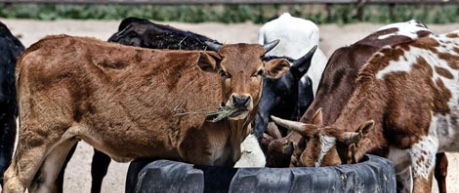Tuesday 12th September 2017, 3:00pm
Roslin scientists embark on a collaborative £2 million project to better understand a livestock disease in sub-Saharan Africa.

An international team will seek to learn how trypanosome parasites – spread by biting tsetse flies – cause long term infections in cattle.
The disease is known locally as nagana, derived from the Zulu word for ‘useless’, which highlights its impact on affected animals. In humans, related parasites cause African trypanosomiasis, also known as sleeping sickness.
The research will build on more than 40 years of study and will focus on the two most prevalent species of parasite behind nagana in cattle – Trypanosoma congolense and Trypanosoma vivax.
Sleeping sickness parasites are known to be masters of disguise. Once in the bloodstream, they can change the proteins on their surface to avoid being recognised and destroyed by the immune system.
By studying these parasites in the animal in which they cause disease, the cow, researchers will improve their understanding of how the parasites establish infections and to develop novel ideas for prevention and treatment.
The project funded by the Wellcome Trust involves scientists at the University of Edinburgh’s School of Biological Sciences and The Roslin Institute, as well as researchers at the Universities of Glasgow and Liverpool, in Lisbon, Heidelberg and Baltimore. They will pool their expertise to discover how these livestock parasites establish long-term infections through immune evasion and maximise their chances of spread.
"The facilities and expertise at Roslin for studying disease in cattle in combination with the different approaches and skillsets of the collaborators involved, mean that we should gain a better understanding than ever before of how these pathogens cause disease – and open up new possibilities for designing future interventions that can lessen the disease burden in sub-Saharan Africa."
Dr Liam Morrison, Senior Research Fellow in the Division of Infection and Immunity at The Roslin InstituteFor further information, please contact:
Catriona Kelly
University of Edinburgh
Press & PR Office
t: 0131 651 4401
e: Catriona.Kelly@ed.ac.uk